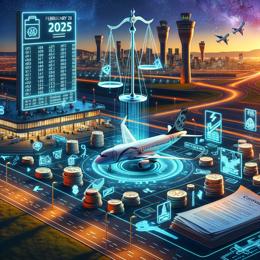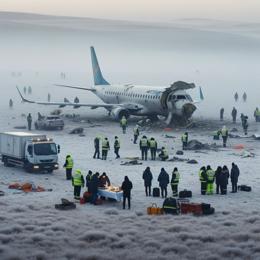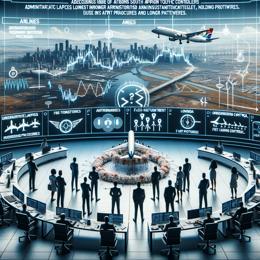Image created by AI
FAA Sets Course for Air Taxi Era with Pilot Training and Certification Rules
The Federal Aviation Administration (FAA) has marked a significant advance in the realm of urban air mobility by finalizing an essential set of rules for pilot training and certification tailored to electric vertical takeoff and landing (eVTOL) aircraft, commonly referred to as air taxis. This move represents a pivotal step in the quest to safely introduce these innovative vehicles into public airspace, with some companies aiming to commence commercial passenger flights by 2025.
This announcement could change the landscape of urban transportation, as eVTOLs offer a promising solution to circumvent heavy traffic by using airspace for short-haul city trips and providing efficient air ambulance services, amongst other applications. The regulatory framework by the FAA ensures a foundation for the anticipated use cases, fostering an environment where airlines and businesses can realistically explore the usage of battery-powered aircraft for services such as airport shuttles.
The significance of the FAA's decision extends beyond just procedural adjustments; it reflects an embrace of new technologies and a preparedness for the pending shift in air travel. FAA administrator Mike Whitaker, speaking at a conference in Las Vegas, noted the importance of a flexible, performance-based approach. This method takes into consideration the unique operational parameters that accompany eVTOL usage, such as varied fuel reserve requirements.
Instrumental in the air taxi industry's growth, this announcement was met with positivity from industry insiders. Billy Nolen, Chief Safety Officer at eVTOL firm Archer Aviation and a former acting FAA administrator, heralded it as a crucial milestone. Simultaneously, Joby Aviation's CEO, JoeBen Bevirt, spoke optimistically about the US's ongoing leadership in the clean flight sector.
Joby Aviation's market performance, alongside other similar ventures, reinforces the commercial potential of air taxis. After going public, Joby Aviation experienced a 7% rise in share price, signaling investor confidence in the sector's future. Notably, Joby has forged strategic partnerships including a recent $60 million investment from Delta Air Lines, intending to offer air taxi services to key metropolitan areas such as New York and Los Angeles. Furthermore, this burgeoning axis of aviation-industry collaboration was exemplified by Toyota's $500 million investment in Joby, underlining a firm belief in the eVTOL market's prospects.
Crucially, the FAA's rule adjustment favors modernized training systems, allowing pilots to learn using a single set of flight controls, in lieu of the previous dual-control requirement. Such a simplification could streamline the training process for pilots, emphasizing safety while catering to the unique demands of operating eVTOLs.
Overall, the FAA's finalized regulations bridge the gap between current aviation standards and the dawn of a highly-anticipated age of air taxis. It lays the regulatory groundwork essential for the safe integration of eVTOLs in US skies, and perhaps, serves as a model for aviation authorities worldwide.










